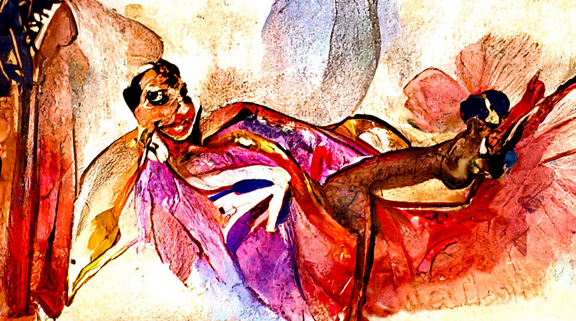Josephine Baker: an iconic woman
On the occasion of Women’s Day, 8 March 2022, we wanted to introduce you to someone who has always been an inspiration to us: Josephine Baker.
Josephine Baker refused to let anyone put a limit on her dreams. At just thirteen years old, she left her poor home in St. Louis to start a new life in France. She was determined to make a better life for herself, and she did. She became one of the most famous entertainers in the world, and she used her fame to fight for civil rights and equality. She never stopped dreaming, and she never let anyone tell her she couldn’t achieve her dreams.
Josephine Baker is an inspiration to us all. She reminds us that with courage and determination, we can overcome any obstacle in our way. Her story is a reminder that we should never give up on our dreams, no matter how impossible they may seem. Thank you, Josephine, for showing us that anything is possible.
Josephine Baker was born in St. Louis, Missouri, in 1906. She was the daughter of a vaudeville dancer and a drummer. As a child, she studied dance and began performing in vaudeville shows. In 1925, she moved to New York City, where she began performing in Broadway shows.
In 1926, Baker moved to Paris, France. There, she became a popular singer and dancer, and her risqué stage shows became famous. She also became active in the French Resistance during World War II, smuggling messages and supplies to Allied troops.
After the war, Baker returned to the United States. There, she became involved in the civil rights movement, speaking out against racism and segregation. She also adopted twelve children of varying racial and ethnic backgrounds, calling them her “Rainbow Tribe.”
By the end of her life, Josephine began her career as a singer in minstrel shows. She then toured with the Lucky Millinder Orchestra. She was discovered by Louis Armstrong in 1922. He renamed her “Josephine” and featured her as a vocalist and trumpeter in his band. They married in 1924, but she left him in less than a year to pursue a solo career. She had hits with “Mean to Me” and “Rockin’ Chair”.
Josephine toured Europe with Earl Hines in 1933. After returning to the U.S., she starred in the Broadway musical “Hot Chocolates”. In 1935, she had her own radio show, “The Josephine Baker Show”, which ran for two years. She also starred in the films “Zouzou” (1934), “Porgy and Bess” (1935)…
In 1941, Baker was recruited by the Special Operations Executive (SOE) and trained as a secret agent. She was parachuted into France in 1943, where she helped to organize the Resistance and smuggle arms and information to Allied troops. She was also responsible for rescuing several downed Allied pilots and helping them to escape back to England.
After the war, Baker was awarded the Croix de Guerre and the Légion d’honneur for her bravery. She continued to work for the French government until her death in 1986.
Josephine Baker’s refusal to perform for segregated audiences helped to change many venues’ policies. During a trip to the US in 1951, she was made a lifetime member of the National Association for the Advancement of Colored People (NAACP). Later that year, she kicked up a storm at the swanky Stork Club in New York, claiming she had been refused service. While Grace Kelly, who was dining at the Stork, rushed to her defence, Baker scolded journalist Walter Winchell, an old ally, for not following suit. The vexed columnist responded with a series of scathing articles, accusing Baker of Communist sympathies. The witch-hunt resulted in the termination of her work visa, forcing her to cancel all her engagements and return to France.
Baker’s success continued during her time in France. She starred in many French theater productions and movies, and in 1938 she became a French citizen after marrying Jean Lion. She loved France so much that she participated in the French Resistance during World War II. Baker was made a sublieutenant in the Women’s Auxiliary of the French Air Force and earned a medal for her work on behalf of the Allies.
In 1951, Baker was touring the United States when she was shocked by the racism she saw. She refused to perform for segregated audiences, and instead devoted the rest of her life to the civil rights movement. She spoke at the March on Washington on August 28, 1963, an event that brought together civil rights groups and leaders to support the passage of civil rights legislation.
In 1969, Baker and her fourth husband, Jo Bouillon, lived in a French chateau they called Les Milandes with their adopted children. Baker continued to perform in order to support her large family, but she was unable to keep up with the costs of her large estate, and the bank foreclosed on her home. After being forced to sell her home, Baker moved to Switzerland, where she lived out the rest of her days in a small apartment. She continued to perform occasionally, but her health began to decline in the early 1980s. Josephine Baker died of a stroke on April 12, 1975, at the age of 67.
This setback did not stop Baker. She continued doing what she loved: singing and dancing. A few days before her death of a cerebral hemorrhage on April 12, 1975, she had performed before a sold-out crowd in Paris. Baker was given a twenty-one gun salute at her funeral in Paris, France, and thousands of people lined the streets to honor her.
Baker became famous for her theatrical performances, but she was also a vocal advocate for peace and equality. She devoted her life to the idea that people of all nationalities can live together peacefully, and she worked tirelessly to fight fascism in Europe during World War II and racism in the United States. Her work has helped to make the world a more inclusive place for everyone.






